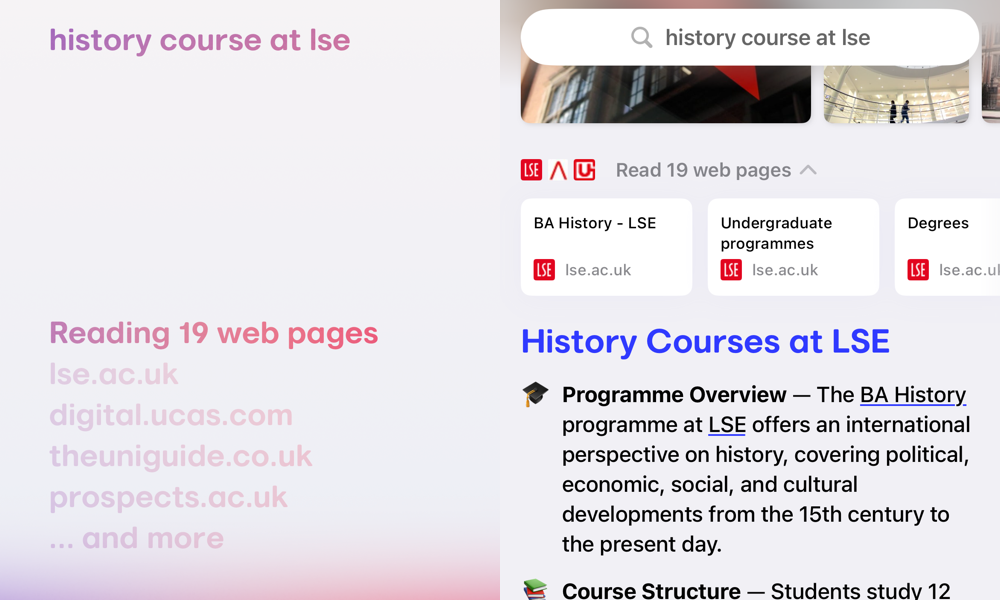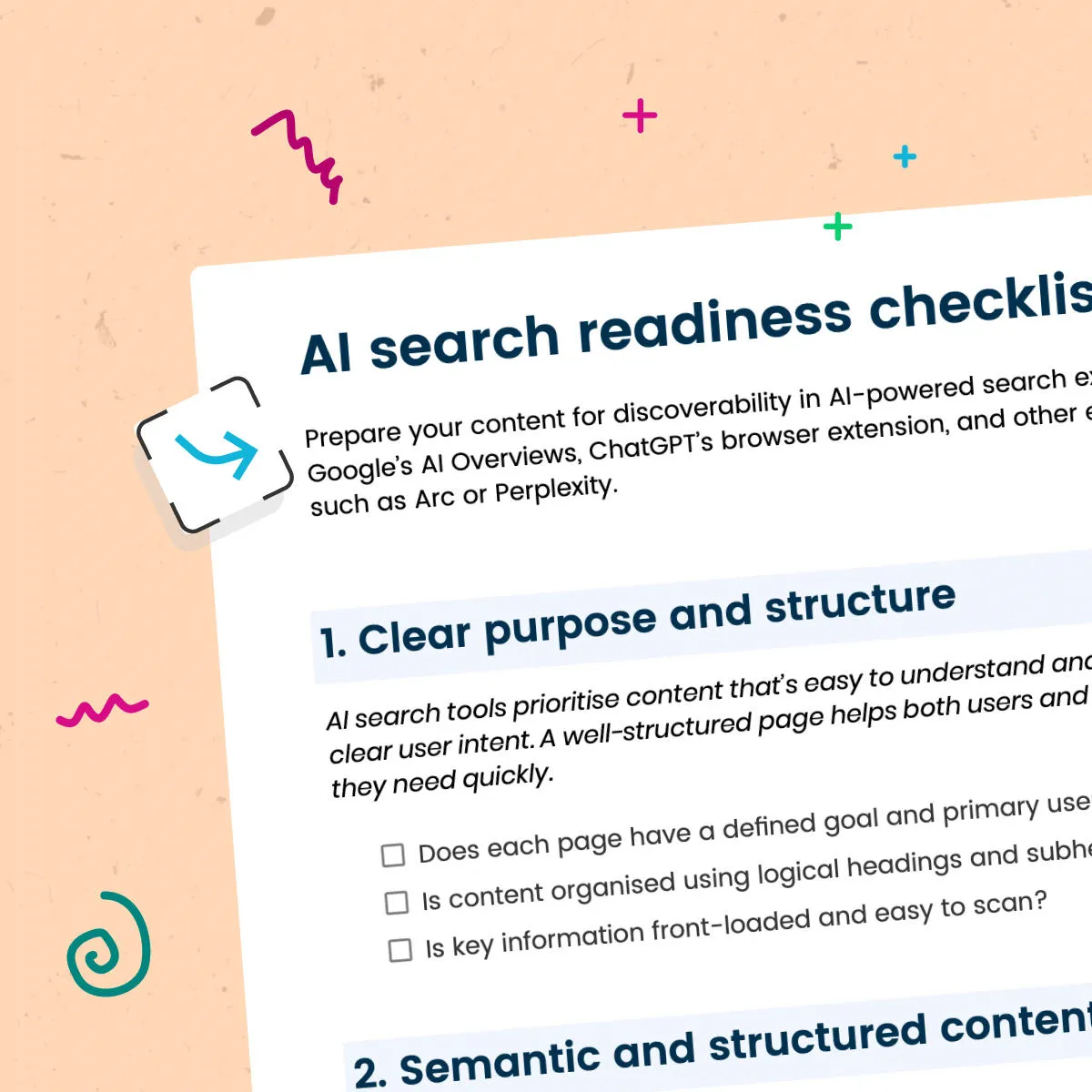How AI search is changing content discovery – and what your CMS needs to keep up
The way we search is changing.
Have you ever asked ChatGPT a question instead of Googling it? Whether you needed a quick summary, help with an email, or a list of places to visit, you probably got what you needed in seconds – no link-clicking required.
Search is no longer about returning links. It's about understanding intent and delivering answers. Tools like ChatGPT, Perplexity, Google's Search Generative Experience (SGE), and the ARC browser transform how people access information.
This raises a significant challenge for organisations: if your content isn't structured for AI search, it might never be seen.
In this blog, we'll look at how AI is changing content discovery, why traditional CMS platforms are falling behind, and how a headless CMS like Contensis can help you stay visible.
From keywords to context: the shift to AI-driven discovery
Traditional search = keywords
Search engines used to work like giant indexes. You typed in a few keywords, and they returned pages ranked by relevance, backlinks, and metadata. You could rank well if your content had the right terms in the right places.
AI search is about understanding
AI search doesn't rely on keywords alone. Large language models (LLMs) like the one powering ChatGPT interpret meaning and context. Instead of returning a list of links, they generate direct answers, summarise sources, and sometimes take actions on your behalf.
These tools use natural language understanding (NLU) to determine what a user really wants. The better your content is structured and labelled, the more likely it will be used and shown in AI-generated results.
Multimodal, multi-platform search
AI search isn't limited to text queries anymore. Users search with voice, upload images, or speak to virtual assistants. And they do it across a growing number of platforms, from smartphones and smart speakers to in-car systems and enterprise apps.
This shift means your content must be ready for any input and output – something traditional web page-focused CMS platforms struggle with.

Why AI search presents a new challenge
AI reads and rewrites your content
Unlike traditional search engines, AI tools don't just index and rank. They extract, reformat, and re-present content. They may summarise your blog, quote your product descriptions, or pull details into comparison tables – all without linking to your site.
This trend, sometimes called "no-click search", is growing. If your content isn't structured in a way AI can understand, it won't appear in these outputs. Worse, it might be attributed to a site that has structured it better.
Structured data is now essential
Content needs to be more than just readable by humans. It must be machine-readable, too. AI-powered tools rely heavily on structured content models, schema markup (like schema.org), and clear metadata and hierarchy. Without these features, your content risks being misunderstood or ignored.
Example: How structure impacts discovery
The rigid CMS approach (what not to do)
A university publishes course information as static pages. Fees, entry requirements, and course lengths are written as plain text in paragraphs without schema markup. AI struggles to parse this content, key course details don't appear in AI-generated lists or summaries, and updating fees means manually editing dozens of pages.
The structured approach (what works)
The same university uses a headless CMS to model course data with fields for title, duration, fees, and entry requirements. Each course includes schema.org markup. AI can extract and understand the data, courses are surfaced in AI-powered tools, and updates apply across all instances automatically.
Why a headless CMS is built for this future
Traditional CMS platforms weren't made for AI
Legacy CMS platforms were built to manage web pages, not deliver structured, API-first content across multiple channels. Content is often hardcoded into templates, making it difficult to extract and reuse.
Headless CMS platforms are AI-ready
A headless CMS separates content from presentation. This allows organisations to define and enforce structured content models, add semantic metadata and schema markup, and deliver content through APIs to any device or AI tool. It also supports consistency, making it easier to keep information accurate and up to date.
How Contensis helps
Contensis supports structured content, schema markup, and API delivery out of the box. It enables you to create consistent content models, enrich your content with metadata, and publish it in a way that makes it discoverable by both search engines and AI assistants.
Whether you're a university, council, NGO, or enterprise, Contensis helps your content remain visible in the new AI-driven landscape.
Preparing for the future: What you should do now
Move beyond traditional SEO
SEO is no longer just about keywords and backlinks. You need to structure your content using defined models, add schema markup and semantic metadata, and deliver content through APIs.
Adopt a headless CMS
If your current CMS can't support these requirements, it may be time to switch. A headless CMS like Contensis makes it easier to adapt to the needs of AI-powered discovery. It gives your organisation the tools to keep content accurate and consistent, deliver it to any platform, and stay visible in AI-generated results.
A short checklist to prepare for AI search
- Audit your content for structure and metadata
- Identify high-value content that should be AI-friendly
- Implement schema markup on key pages
- Review your CMS platform's ability to support APIs and content models
- Explore platforms like Contensis that support these capabilities
Conclusion: Get ready for what's next
AI-powered search is here. It's changing how users find information, and it's already affecting visibility.
If your content isn't structured, accessible, and delivered through APIs, it may be left behind.
A headless CMS like Contensis gives you the foundation to adapt—helping you stay visible, relevant, and competitive.
The organisations that act now will be ahead of the game.
Want to see how Contensis can help you prepare for AI search? Explore our guide to structured content or get in touch.








